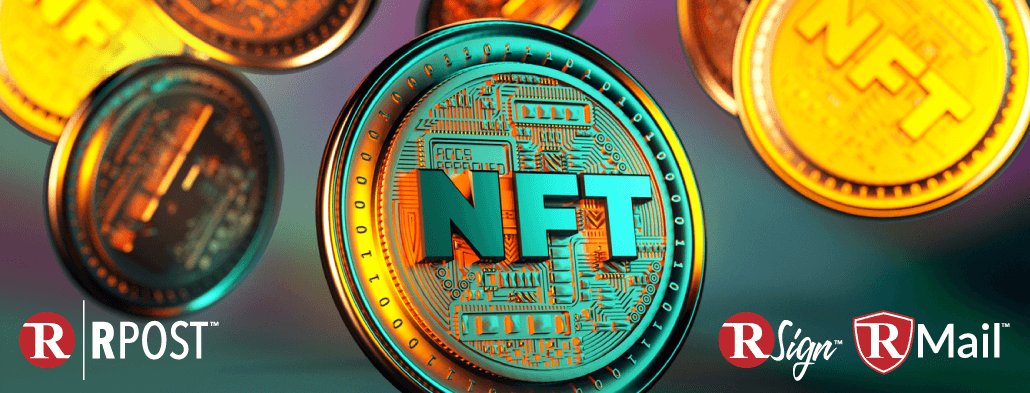
Overall, we like capitalism here at RPost. By most measures, it has lifted countless people out of poverty and has inspired world-changing innovations. But one of the oft-cited criticisms of capitalism is that it creates bubbles—housing, stocks, tulips, NFTs, you-name-it.
[Re-live Tech Essentials webinar with The Florida Bar held on July 6 — Tech Essentials by Legal Fuel of The Florida Bar & RPost: How to Thwart Today’s Top Cyber Criminal Lures – Free CLE Credits Offered]
With NFT World in New York City this week, we thought we’d educate on this Web 3.0 tech. The NFT (non-fungible token) craze is most known for creating a means to safely own (and trade on) digital art, as the NFT element can demonstrate ownership of the authentic digital original. NFTs are part of the blockchain phenomenon.
Focusing on the art-collecting side of NFTs, you may have heard about the Bored Ape Yacht Club (BAYC), which features profile pictures of cartoon apes that are created by “meta-native artists”. You can ‘own’ one of these digital pictures and secure your ownership through each piece of artwork’s NFT.
The value? Hard to explain. Beyond the aesthetic beauty of these digital ape drawings, there are “real-world” privileges like dressing up as your ape (as some are doing at NFT World), membership in a grunge (but exclusive) yacht club with an address in the metaverse, and the power to write graffiti in the bathroom of this metaverse-situated yacht club in the future, when construction in the metaverse is completed. You’re not alone if you’re confused or skeptical, but sales of BAYC NFTs have totaled over $1 billion.
One challenge of these NFTs is trying to justify their value – some of these BAYC NFTs, after all, are selling for a few hundred thousand dollars each. Another challenge, perhaps somewhat hidden today, is how to “protect” one’s ownership rights.
For some reason, BAYC chose to convey all rights to further commercialize any of its NFTs purchased to the buyer. This sounds great to the buyer, but it, in a sense, effectively offloaded the obligation to an NFT owner to defend their own NFT against counterfeits; counterfeits made in the digital art world as easily as pressing ctrl + v (copy-paste).
The cost for a consumer to defend against counterfeits of popular NFTs is now enormous — I would say similar to the cost of Luis Vuitton and Rolex defending against counterfeit handbags and watches. Even organizations like the Bored Ape Yacht Club (BAYC) that recently minted $400 million in a private equity infusion chose not to spend their money to try to defend its 10,000 NFTs from sellers of copycat replicas (infringers) of its digital art.
Sure, one can determine if a digital asset is real due to the hashing technology that underlies the blockchain, but for the layperson, an image is an image. Put another way, would you rather own the actual, duly authenticated David sculpture or one of those replica David statues you can buy on the side of Santa Monica Blvd (or, even more so, a picture of the David on your phone). Will this minimize the value NFTs? That’s the big question that markets may be answering now.
Ryder Ripps, an artist, created a “re-contextualized” version of some of the BAYC Ape NFTs by re-minting Apes and listing them on his NFT site, Foundation. His apes look identical to the “original” Bored Apes. He initially received a takedown notice from BAYC owner, Yuga Labs. It was later disputed, then rescinded, presumably because BAYC did not want to risk fighting this in court and creating a rift of uncertainty in the market of their NFT ownership value. Ripps sees this as proof that Yuga and their ilk aren’t doing much to protect NFT holders. (He’s also sold t-shirts featuring Apes he doesn’t own with no consequences so far.) This harkens back the very pre-NFT concept that intellectual property laws are only as good as the people who have the money and grit to enforce them.
Will the lack of ability to enforce one’s NFT ownership rights kill the NFT market? Or, is the strategy to blanket the market with fake NFTs to build awareness of the authentic version, and thereby create demand (and value) for the authentic one? (Think, the Gucci purse replica strategy.)
Bringing this back around to business technology, there is another way to use blockchain-esque tools to create an authenticatable record of original digital content, of who said what to whom by email, or who signed what when.
Lurking in your inbox (if you installed the RMail app for Outlook or Gmail) you have the Registered Email™ service by RPost. For more than a decade, in countries around the world, inventors and business people have used this service as a means of generating a third-party timestamped record of content; self-contained, durable, and verifiable proof. It lets any sender receive legal and verifiable proof of email opening, successful delivery, message and attachment content, with an official timestamp of when content existed.
Likewise, it includes RSign eSignatures, which create a blockchain-esque digital authentication record of who agreed to what when.
Know More:
How to Add a Digital Signature to a PDF
While perhaps not as cute as a bored ape headshot, these digital authentication services by RPost seem far more useful to the general business world. After all, they make it easy to verify the authentic versions of a business agreement, correspondence, ideas, and content in the real world; without having to fiddle in the metaverse.
(Contact us to discuss how you can get started with RMail, Registered Email™ or RSign services today.)

February 20, 2026
.jpg)
February 13, 2026

February 06, 2026

January 30, 2026

January 23, 2026